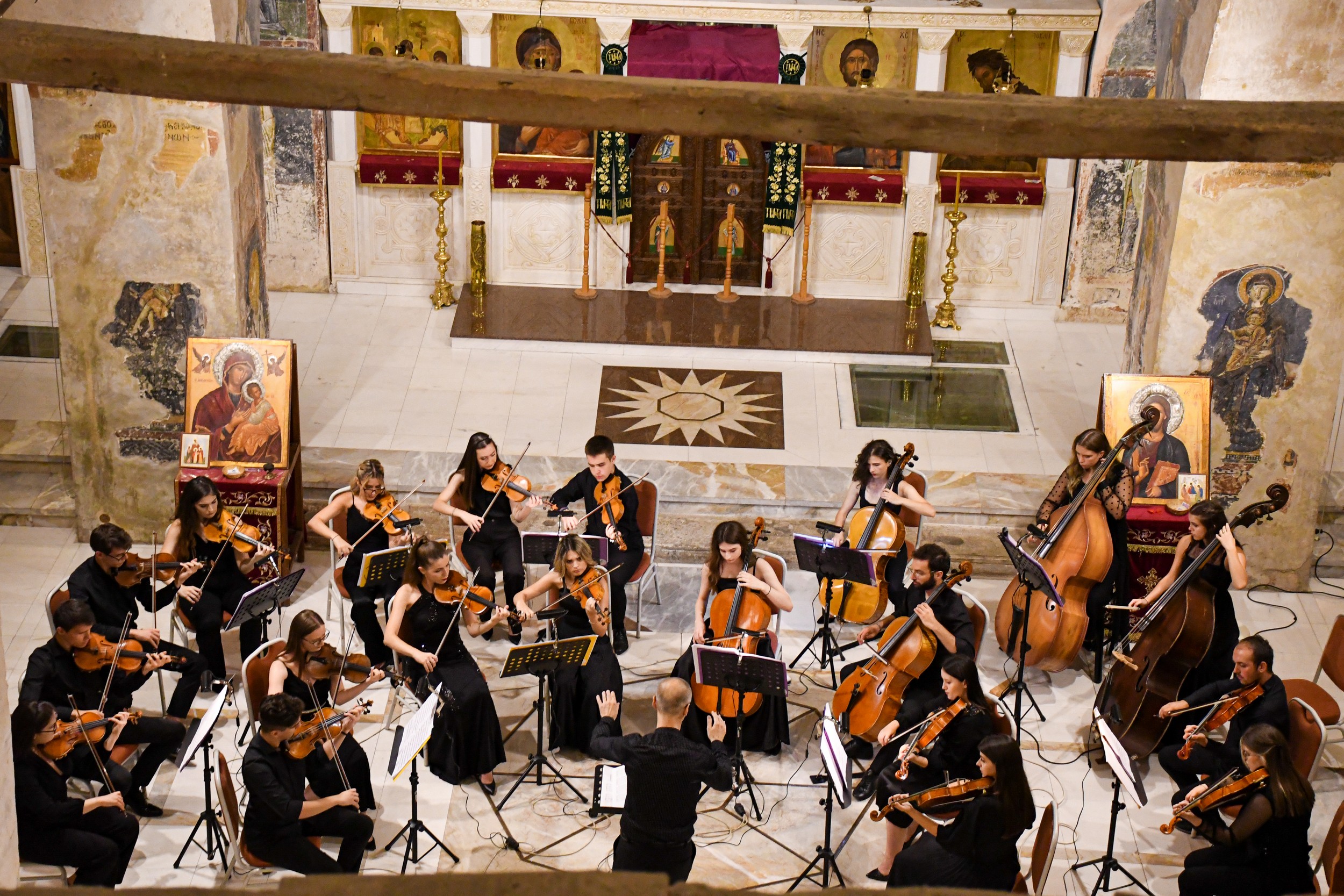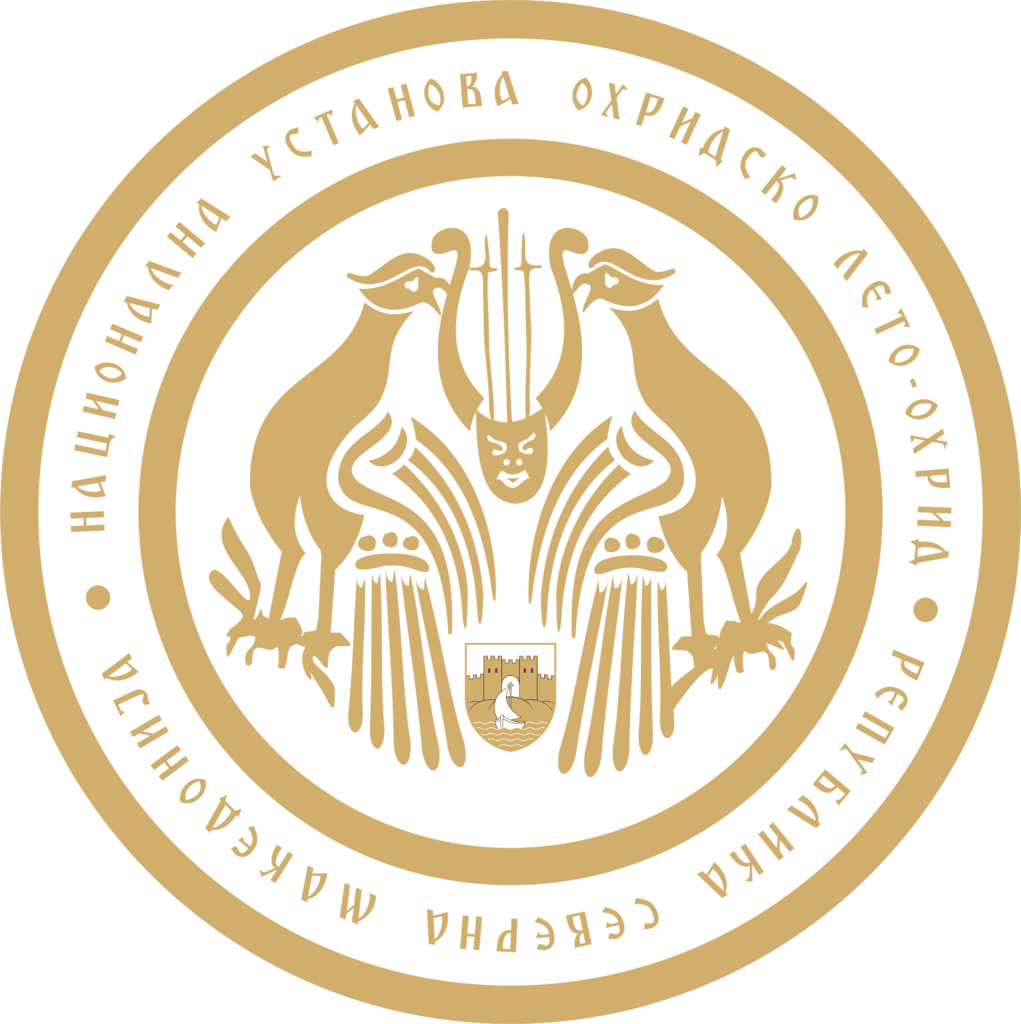
For 36 years in a row, the final concert of the summer session of the Chamber orchestra of the Jeunesses Musicales Macedonia (in 2018 named after the conductor Sasha Nikolovski Gjumar), has been part of the Festival Programme of the Ohrid Summer Festival. For three and a half decades, more that 400 young and prospective musicians have been creating the musical ambience at concerts of this specific and original ensemble, thus entering the sphere of their professional concert life. Since its foundation in 1987 and the first concert held under the baton of its founder and year-long artistic manager of the ensemble, Fimcho Muratovski, gradually becoming part of the tradition of Ohrid Summer Festival, and today, undoubtedly its inseparable part, the concert of Jeunesses Musicales Macedonia have special significance for the Festival, and also a special place among the audience.
Such was this time, as well, with a packed audience in the St Sophia church, where the young musicians, with incredible enthusiasm, energy and openly shown passion, for more than an hour, under the baton of maestro Borjan Canev, managed the music space and created art. The strong cohesion between the conductor and the young string musicians was obvious, based on a reciprocal relationship. Canev, with his personal and professional authority, lead the orchestra very successfully, eliciting the maximum from the capacity of the quite young musicians, part of which performed in a chamber orchestra for the first time. On the other hand, the orchestra members, closely following his movements, effectively reacted to their conductor’s requirements, together, leaving an impression of a well-prepared, professional ensemble, whose high professional level of music culture and performance sent the message that young musicians announce a bright future. At the concert this year the Chamber orchestra of Jeunesses Musicales Macedonia had a carefully chosen programme, which the conductor Canev, with his experience, successfully conceived to fit the age of the ensemble members. Thus we had the opportunity to hear a varied author and genre choice of attractive pieces, with which the orchestra performed in full brilliance. The concert began with one of the most popular pieces by the Baroque master Johan Sebastian Bach, and, relatively said, a compulsory literature for young violinists above all, the second movement, “Air” from the “Orchestra Suite No.3”. Eliciting the polyphonous thought of the great composer, carefully dosing the dynamics by the conductor, we heard a subtle interweaving of the melody lines in the violins, in contrast with the rhythmical movement in the low-tone instruments.
Continuing with the also popular “Divertimento 137 in B major” by Wolfgang Amadeus Mozart, named as “Salzburg Symphony No.2”, the orchestra showed quality technique and interpretative emission, shaping the wide and relaxed first movement, gradually building the tension in the luxurious second movement, exaggerating the abundancy in the thematic development and graciously, interpreting the dance character of the third one.
With the confident and precise performance of the violas in the “String serenade op.20” by Edward Elgar, the young musicians guided us to the late English Romanticism, colouring the tone pictures with a refinedly created dynamic nuance.
An introduction to the concert culmination was the premiere of the piece “V-root-OK” by the young and perspective Macedonian composer Angel Spirovski. Following the introduction of this composition from the side of the conductor Borjan Canev, who clarified that the piece is specially written for a chamber orchestra, we had the opportunity to acquire his idea vividly, transmitted to the young musicians, who, with notable excitedness and creative elation approached the performance of the piece by their young colleague. In this composition, which title is an allusion of Vrutok, the spring of the Vardar River, symbolizing that with a youthful character of the ensemble, as a source of life and art, Spirovski creatively builds the compositional structure. Associating a slow outflow of the spring water the composition starts with a calm entrance of the double-basses, gradually spreading the music material among all orchestra groups, building the developing part with a dense orchestration, fast rhythm and forte dynamics, showing the fast river flow, thus, making solo parts for cello and violin, which the musicians performed very suggestively. After the abundant culmination, Spirovski ends the composition calmly, representing the established calm flow of the water, with reminiscence of the beginning and the subtle performance of the double-basses.
The concert culmination, Jeunesses Musicales Macedonia reached with the performance of the symphonic intermezzo “Meditation” from the opera “Thais” by Jules Massenet, with a solo performance of the concert master of the orchestra, Darko Grozdanovski, who was simply brilliant, confidently mastering the concert podium. Demonstrating an excellent technical preparedness, with a special feeling of artistic modelling, Grozdanovski masterly expressed the emotional density and passion in this popular piece.
The ensemble completed its concert with “Capriol”, suite by Peter Warlock, where, through the five short movements, based on popular Renaissance dances, had the opportunity to show its whole temperament.
The encore, through the pizzicato performance (at points contributed by the sound of the whistles) of the composition “Plink, Plank, Plunk” by the author Leroy Anderson, essentially showed all we had the opportunity to see and hear during the whole concert – charm, joy and the exposed musicality of the young instrumentalists and their conductor, Borjan Canev.
The audience, as usual at these concerts, adoringly accepted the communication signal the artists and wholeheartedly answered to their music provocation.
Aleksandar Trajkovski

